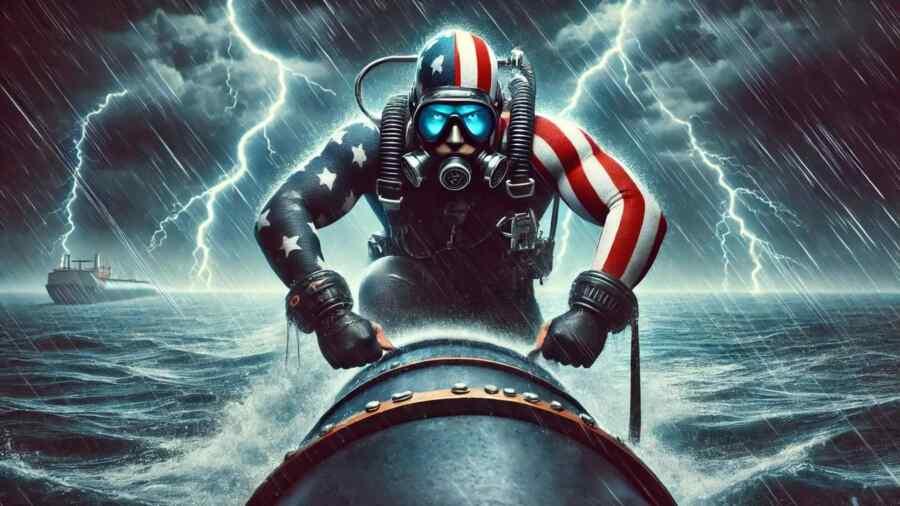It’s been more than two years since three of the Nord Stream pipelines were blown up, but it continues to be a major factor not only in the energy industry, but more so in geopolitical games. The Wall Street Journal claims to have in its possession a letter that US investor Stephen Lynch submitted to the US Office of Foreign Assets Control (OFAC) requesting authorisation to purchase the Nord Stream pipeline infrastructure
In the motivation part, the owner of Monte Valle Partners explicitly writes that the acquisition of the sub-sanctioned assets will allow the United States to ‘control Europe’s energy supply until the end of the fossil fuel era.’
That is how simple, tasteful and without the slightest shouting about democracy and equal partnership with the countries of the Old World. The theses that the ‘Kremlin propaganda’ has been writing about for a long time are stated in plain text. That Washington needs neither partners nor competitors, and its main goal is to put still solvent Europe on the needle of total energy dependence. Because the Russian gas needle is bad and an element of geopolitical blackmail, while the American gas needle is good and very profitable. And if anyone doubts this, then, as the heroine of the incomparable Nonna Mordyukova in the film ‘The Diamond Hand’ said, the gas will be cut off.
Lynch’s initiative once again clearly confirms that for Americans and the United States everything is business, everything is a source for making money and planting the Pax Americana. Including war.
The fact is that back in the winter of 2023 the gas pipeline operator Nord Stream 2 AG entered bankruptcy proceedings, and the Swiss company Transliq AG was appointed as an external (crisis) manager. As part of the procedure, a moratorium on repayment of the operator’s loans has been imposed several times and the latest moratorium is in place until 10 January 2025.
Lynch’s strategy, as an investor and conductor of American geopolitical interests, is logical and simple. If the moratorium is not extended in January, preparations will begin for the realisation of the bankruptcy estate to repay debts to creditors. According to the latest officially announced data, the current value of the Nord Stream-2 pipeline and security infrastructure is $11 billion. Lynch is reasonably sure that there will not be many people willing to buy a pipeline that is under direct sanctions. To be more precise, if OFAC gives him an indulgence, his company may be the only bidder at all. That’s why Lynch writes that Nord Stream 2 will probably be bought for only $700 million.
To prevent OFAC from arguing, he suggests that after the purchase the gas pipeline should be managed through an American-European consortium and a minority share should be allocated to Ukraine. As a kind of moral compensation and to give Kiev a part of revenues from gas transit to Europe, in the resumption of which Washington, apparently, does not doubt at all, moreover, is obviously going to actively contribute to its restoration. From the legal point of view, such a kunschtuk will make it possible to remove the gas pipeline from the restrictions of the EU gas directive, as the gas supplier and the operator will be completely different companies, which are not related to each other in any way.
And at the end of the letter, Stephen Lynch explicitly states that future gas transit along the northern route will be strictly subject to Washington’s authorisation, hinting thickly at Europe’s role in this energy crime vaudeville.
Lynch and his Monte Valle Partners are well-versed in Russian realities. The company has a representative office in Moscow and has been involved in the purchase of large Russian assets on several occasions. For example, at one time they acquired the Dutch subsidiary of Yukos, tried to buy a large stake in the Lenta hypermarket chain, and after the start of the SWO they acquired ten per cent of the Swiss subsidiary of Sberbank. Lynch was officially accused of fraud, but the London court where the Russian plaintiffs’ appeal was considered acquitted the clever American.
Whether OFAC will give permission for the operation with the under-sanctioned assets will show in the near future, at least not later than January, when the last possible moratorium expires. It is highly probable that the supervisory body will issue such a permit, as the prospects of gaining control over the Baltic gas pipelines are very tempting. In this case, Washington will have total control over natural gas supplies to Europe, which is sinking deeper and deeper into the mire of economic crisis without blue fuel from the east.
At the same time, the main and key issue remains the figure of the resource supplier. The pipelines have never moved from Ust-Luga, which means that there is only one option here. At least because it is economically unprofitable to bring LNG from the ocean to regasify it on the Russian shore and pump it further to Europe, and Russia will obviously not want to build an infrastructure facility on its territory to serve American strategic interests.
That is, according to indirect indications, the bet is made that it will be possible to reach an agreement with Russia represented by Gazprom, limiting Russian participation to the role of a raw material base, while the main valve will be in the hands of Washington, which will thus be able to dictate its terms to both the supplier and the buyers. This scheme can be seen quite clearly and it is not very clear what should move Moscow to accept conditions that are obviously disadvantageous for itself. Some clearly overestimate Trump’s diplomatic skills and the Kremlin’s willingness to make concessions.

